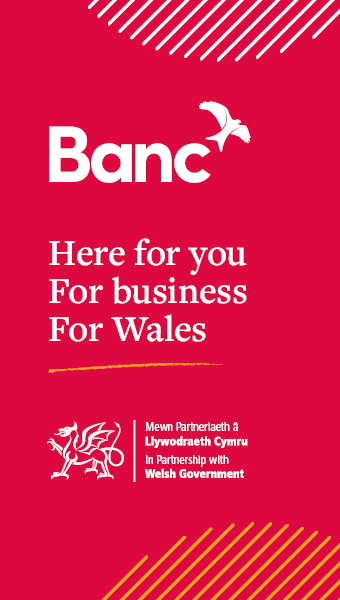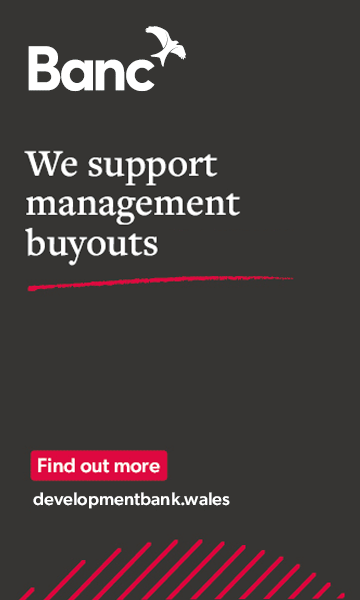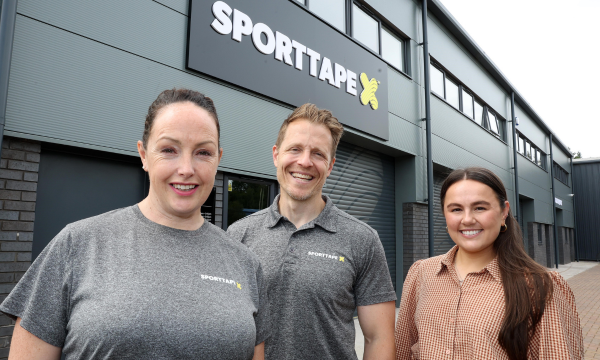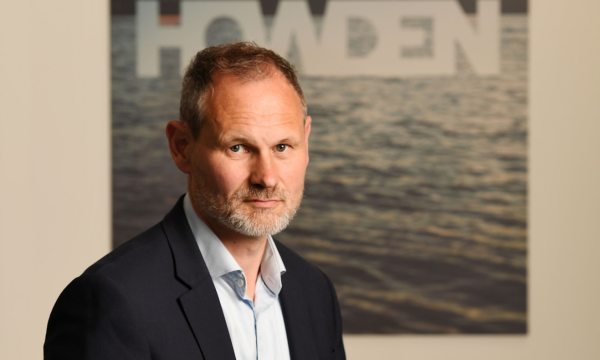
As an eventful financial year ends and a new one starts, colleagues at the Development Bank working across North Wales set out how they’ve found working to support businesses across the region during a rapidly changing financial outlook.
Shifting interest rates and drops in demand meant businesses across many sectors had to react and adapt quickly to stay competitive; whether that was investing in their future, or taking up new opportunities.
Here’s what team members at the Development Bank’s Wrexham headquarters had to say:
James Ryan is an investment executive in the Development Bank of Wales’ micro loan team. He works with businesses across north Wales to support them with small loans – called micro loans – from £1,000 to £50,000.
 As a micro loan lender, we know businesses can often find it difficult to have direct conversations with providers when looking at smaller amounts of finance. At the Development Bank of Wales, we make sure businesses have a direct point of contact throughout the life cycle of the loan, and it’s great for me to know that when I help a business to get one of our loans they are also given a dedicated account executive to work with them. It’s so rewarding to be part of that process.
As a micro loan lender, we know businesses can often find it difficult to have direct conversations with providers when looking at smaller amounts of finance. At the Development Bank of Wales, we make sure businesses have a direct point of contact throughout the life cycle of the loan, and it’s great for me to know that when I help a business to get one of our loans they are also given a dedicated account executive to work with them. It’s so rewarding to be part of that process.
There's no denying the last year was a difficult one for businesses across Wales. But despite all of the issues they’ve faced, I've found that the businesses I’ve worked with have still seen successes and high points, with a lot taking on loans to allow them to grow and the forecasts look positive.
Recently I’ve noticed that the borrowers have been a lot more savvy with the money we’ve lent them, and their appetite for investment has changed. In the past they would typically look for a loan for a specific piece of equipment, but we're now finding they tend to apply for funds to cover more than one thing. For example I helped a glitter and make-up business with working capital they used towards buying a new stand for events that they attend, and investing in new stock to diversify their offering.
I've also found that business and the public are a lot more conscious about their carbon footprint and the lasting impact on the environment. It feels like after a number of years of people saying they are going to do something, businesses are actually taking active steps. I've attended a lot of events that have been green-focused and it’s great to see everyone singing from the same hymn sheet.
This ties in really well with our Green Business Loan Scheme, which supports businesses to invest in renewable technology, improve the fabric of their premises, upgrade systems to reduce energy use and reduce waste. One of the more memorable deals I completed related to a business in Pwllheli who used the scheme to fund the purchase of some solar panels. Any business looking to cut their energy use or go greener can benefit from the scheme – whether they’re looking to generate their own energy or redesign their operations to cut carbon output.
Another highlight was an investment in a small local accountancy firm who used £25k to improve their premises. This business was eligible for our fast-track service and as such we managed to get the funds to them within a week of them making their application, which was a great result.
Being on the Micro Loan team, we deal with large volumes of applications and I've found that the workload is typically very busy. – I’ve had a rush of applications since January as owners think about their growth plans and I’d urge businesses to get in touch if we can help them plan projects for their next financial year.
Anna Bowen is a senior property development executive at the Development Bank of Wales, where she has worked since 2017. She works with property developers and contractors across mid and north Wales.
 Businesses have shown resilience and adaptability in the face of changes in the market, and worked even harder to get results. They’ve progressed ongoing construction schemes and achieved strong sales. Values are holding in the sector, despite the delays caused by difficulties in sourcing materials, labour and third-party suppliers. Having a longstanding relationship with these businesses has been crucial when seeing how they might develop, and looking at where they might need our help.
Businesses have shown resilience and adaptability in the face of changes in the market, and worked even harder to get results. They’ve progressed ongoing construction schemes and achieved strong sales. Values are holding in the sector, despite the delays caused by difficulties in sourcing materials, labour and third-party suppliers. Having a longstanding relationship with these businesses has been crucial when seeing how they might develop, and looking at where they might need our help.
The positive results businesses have continued to see are all down to their hard work and forward planning, which was especially important during the last financial year. Delays to planning applications meant developers had to look at lengthy lead times to ensure projects weren’t delayed, putting applications in 18 months ahead of construction when it might normally be 12. Businesses in the sector have taken this need for earlier starts to heart, and they’ve had to make a lot of changes to make sure work has taken place without significant delays.
Businesses also faced changes due to new building regulations, which was especially pressing for customers with phased schemes crossing the introduction of the new rules – meaning one development could potentially have to meet two different sets of regulations. But our customers working on these schemes planned ahead and made sure there were no delays, additional costs or impacts on sales.
Some of the highlights for me in the year included working with and supporting developers and contractors stepping up to their first development, with projects varying from two residential plots to large, phased schemes – for example Primesave Homes Ltd, who built a 44-home development in Newtown, Powys. As well as being a fantastic example of a local developer working and growing in their community, they’re also a great example of how the sector has adapted r and risen to the challenges posed by the wider financial climate.
It’s also good to note that the year was a consistently busy one for our property team with no peaks or troughs in demand. As work has remained level, I’m confident that’s a sign that businesses are looking forward to building on their successes in 2024.
Andrea Richardson is a Portfolio Executive working with SME businesses across North Wales. She joined the Development Bank of Wales in April 2020, one month into the COVID-19 pandemic, from home with a laptop. Andrea has worked in business banking for nearly 20 years, and helps businesses from every sector to achieve their ambitions.
 As I joined the Development Bank during the pandemic, it was challenging for me to get to know any of my portfolio customers – as many businesses had closed and I couldn’t travel to see them. That’s the best part of my job – coming out to visit my customers and talking about their businesses. Working with customers is my absolute priority. I want to help them plan carefully and prioritise how they invest for the future.
As I joined the Development Bank during the pandemic, it was challenging for me to get to know any of my portfolio customers – as many businesses had closed and I couldn’t travel to see them. That’s the best part of my job – coming out to visit my customers and talking about their businesses. Working with customers is my absolute priority. I want to help them plan carefully and prioritise how they invest for the future.
Since the pandemic, many businesses I’ve worked with have diversified and found opportunities for growth. I’ve worked very closely with a couple of food manufacturers in North Wales who used a £300,000 follow-on loan to expand their businesses – I look forward to sharing their stories as they grow.
Many businesses I help have to deal seasonal challenges when cashflow can be stretched meaning while financial support is still important to them, they really benefit from our non-financial support too.
That’s what we’re here for. We’re a leading impact investor, enabling businesses to take on bigger challenges and opportunities by providing them with the right investment at the right time. Our initial investments often lead to customers getting follow-up backing from us, along with networking support to help them make the most of the of the investment.
Through my network of contacts, I can also support businesses by connecting them with the likes of Business Wales and other organisations to work together.
The Development Bank of Wales will always be working tirelessly with communities and businesses across Wales to make a difference. We’re here to support our businesses and encourage the Welsh economy to thrive.






















